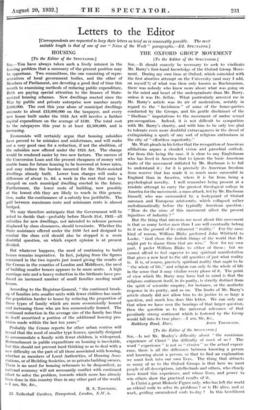THE OXFORD GROUP MOVEMENT [To the Editor of the SPECTATOR.]
SIR,—It should scarcely be necessary to seek to vindicate
Mr. Barry's first-hand knowledge of the Oxford Group Move- ment. During my own time at Oxford. which coincided with the first abortive attempt on the University (and may I add, on myself ?) of what was then only known as Buchmanism, there was nobody who knew more about what was going on in the mind and heart of the undergraduate than Mr. Barry, unless it was Dr. Selbie. What particularly arrested me in Mr. Barry's article was its air of moderation, notably in regard to the " lavishness " of some of the house-parties conducted by the Groups, and his gentle disclaimer of the " libellous " imputations to the movement of undue sexual pre-occupation. Indeed, it is not difficult to sympathize with Mr. Barry's charity, and with him to be only too glad to tolerate even more doubtful extravagances in the dread of extinguishing a spark of any sort of religious enthusiasm in the city of " effortless superiority."
Mr. Watt pleads in his letter that the recognition of American
affiliations argues a clouded vision and parochial outlook. Far from this being the case, it is clear to any Englishman who has lived in America that to ignore the basic American traits of the movement initiated by Mr. Buchman is to fail to understand it ; for it is precisely its American freedom from reserve that has made it so much more successful in England than in America, where it is far from being a psychological novelty. I well remember being present at a resolute attempt to carry the greatest theological college in America for the movement, a mass attack, led by Mr. Buchman himself, who was surrounded by a bodyguard of Oxford oarsmen and European aristocrats, which collapsed rather melodramatically before the typically American question : " How do the aims of this movement affect the present injustices of industry ? "
But the thing that interests use most about this movement
is that so many better men than I am will eventually belong to it on the ground of its enhanced " reality." For the same kind of reason, William Blake preferred John Whitfield to Locke. " God chose the foolish things of the world that He might put to shame them that arc wise." Now for my own part, I prefer William Blake to either of them ; but we cannot afford to feel superior to any spiritual manifestation that gives a new heat to the old question of just what reality is. It is, of course, precisely spiritual reality that ought to be " the whole of life," and religion can only be the whole of life in the sense that it may vitalize every phase of it. The point of view which Mr. Barry may have had in mind is that the religious sentiment itself, in its purity, is strictly distinct from the spirit of scientific enquiry, for instance, or the aesthetic response in its purity, and so on. The limits of Mr. Barry's article clearly did not allow him to do justice to so large a question, and much less does this letter. We can only say
that when we have seen the bearings of that larger question, then the question as to the universal relevance of that peculiarly strong sentiment which is fostered by the Group would fall into its true place.—I am, Sir, &c.,






























 Previous page
Previous page